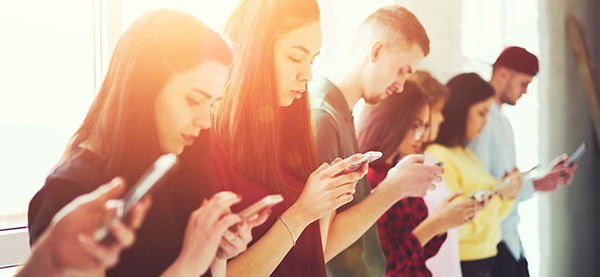The lifestyle of people who were born in the era of digital technology and rapid technological advancements differs from the lifestyle of previous generations. 50 years ago, we could not imagine that we would be able to communicate with someone on the other side of the globe, using instant messengers and video as well as to get access to all the required information in a few seconds and a couple of clicks. Today, we are provided with tremendous benefits and endless opportunities, and we take that for granted already. The so-called Generation Z can hardly imagine their lives without the Internet and devices since they have already become one of the most usual things. However, often dependence on devices begins to affect mental health and people’s relationships. Western psychotherapists have even come up with a special word that describes the problem.
What Is Phubbing?
Like any other addiction, phubbing is based on the idea of psychological comfort. In this case, it is about the accessibility of any information. Using a smartphone or a laptop, you can do almost everything. It is not that easy to give up the temptation to get all this info. So, what does phubbing mean?
Phubbing is a form of addiction when a person spends almost all their time on the Internet, and it does not matter whether they are hanging out with friends, are on a date with a beloved one or are in the workplace. The phubbing definition describes a kind of social “drug” akin to a nervous tic. Thus, a man devotes his attention to the smartphone being in a company of other people and even having a dialogue. He can chat with other people at the same time and get annoyed when he does not have this device at hand.
The phubbing meaning first appeared in 2012. The term is derived from “phone” and “snubbing.” Its authors worked at the advertising agency and deliberately looked for the name of this phenomenon.
Psychologists from the University of Kent (Ohio) have documented a large tendency to phubbing in women and have revealed a correlation between phubbing and FOMO. While FOMO is about the fear of missing an interesting event or a good opportunity, which is triggered by watching social networks.
 Phubbing statistics show that about 55% of women and 24% of men aged 18 to 67 are distracted by smartphones during conversations with a partner at least twice a day. 37% of men and 67% of women regularly notice phubbing on the part of an interlocutor. And every year the number of “smartphone-dependent” is growing. So, what is phubbing? It is a disease of the 21st century.
Phubbing statistics show that about 55% of women and 24% of men aged 18 to 67 are distracted by smartphones during conversations with a partner at least twice a day. 37% of men and 67% of women regularly notice phubbing on the part of an interlocutor. And every year the number of “smartphone-dependent” is growing. So, what is phubbing? It is a disease of the 21st century.
Australians were the first to notice this problem. They’ve created a “stop phubbing” movement. Nowadays, special conditions are created in many cafes and restaurants in Europe to contribute to live communication, for example, they turn off WI-FI.
How Does Phubbing Affect Romantic Relationships?
In 2015, scientists conducted a study among young people who were in a relationship. They made a disappointing conclusion and voiced that phubbing negatively affects the relationship of the couple. A partner can get depressed and begin to be jealous of the smartphone of the significant other. As a result, there are no romantic manifestations in the couple, their sexual life leaves much to be desired, and there is a high probability of a breakup.
Phubbing is one of the root causes of scandals in a couple. Often, people quarrel due to jealousy, money, and children, but today, many people sort things out over gadgets as well.
At first, the study was conducted among women, and they said that their soulmate is not often distracted by their phone. Nonetheless, they also said that if the man started paying too much attention to the phone during a conversation, they became upset, made a scene, and got depressed, feeling their worthlessness.
Couples who have been married for a long time suffer even more from that phenomenon. If the younger generation feels okay about using gadgets more often and tries not to notice this addiction, then the older generation begins to get extremely nervous. Having lived together for a long time, people begin to depend on each other, and any neglect on the part of the partner causes aggression.
Communication
Smartphones reduce the interest of couples in communicating with each other. As soon as one of the partners becomes an overly active user of a social network, they gradually begin to replace real communication with a virtual one. At first, it is easier to send a pic instead of showing it, then they replace the real kiss with an emoji. Over time, such a person may have difficulties with the recognition of real emotions since emojis are not used in live communication. Feelings for your significant other, romantic relationships, and spending time together begin to seem boring and blah compared to the information in the social networks and virtual reality. Besides, a person cannot concentrate their attention on the talk since all their thoughts are about the necessity to check the phone. For example, an average American checks the gadget about 150 times a day, and it is every six and a half minutes! It is not surprising it is difficult to concentrate, keep a conversation going, and create a strong emotional connection with the interlocutor.
Sex life
An intimate sphere of relationships suffers as well. In many cases, smartphone addiction undermines the sex life of many couples. Gadgets are a kind of “barbiturates” and an excuse to escape from the problems of the real world. Therefore, both men and women create an emotional connection with their devices, which, in fact, is an unhealthy phenomenon. If a partner, while in bed, begins to check mail or updates on social networks, then at the subconscious level, their significant other receives the following signal, “There are more important and interesting things than sex with you.” Such resentment builds up over time and is not always recognized by the partner, but it slowly poisons intimate relationships and worsens the quality of sex, and then it can gradually provoke depression.
Phubbing Affects Other Social Interactions
Scientists have conducted research and concluded that phubbing does not appear from scratch. It is associated with a lot of bad habits and mental problems.
The Internet and all its abilities are addictive. A person wants to be in the spotlight and therefore, they upload new photos, read the news feed, and share their thoughts. Soon, a person cannot do without their phone, and real life with all its challenges take a back seat. Thus, a person might not meet deadlines at work, spoil relationships with friends, and begin to treat everyone around differently since they are not that interesting as social media.
 As we have already mentioned, this addiction is also manifested differently depending on gender. For example, women become dependent faster, and it is extremely difficult for them to give up this habit. Girls make new acquaintances, get compliments and likes, watch new collections, and are in the spotlight – all the contribute to the development of their self-esteem, and they don’t want to give up this fake doping. Men perceive a smartphone as a technique with advanced features.
As we have already mentioned, this addiction is also manifested differently depending on gender. For example, women become dependent faster, and it is extremely difficult for them to give up this habit. Girls make new acquaintances, get compliments and likes, watch new collections, and are in the spotlight – all the contribute to the development of their self-esteem, and they don’t want to give up this fake doping. Men perceive a smartphone as a technique with advanced features.
Phubbing spreads very quickly, and this is not surprising. If there is at least one “infected” in a company, then the rest automatically take their smartphones and begin to behave similarly. So, phubbing relationships are a dangerous thing.
Phubbing Affects a Personality
Phubbing is an addiction that adversely affects the owner. As a result, a person becomes unsociable, irritated, and can be easily compared with a gamer who cannot live without their gadget for a minute. Soon, they may face serious health problems and need the help of a qualified specialist. A person is afraid to turn off the phone, they believe that they will miss something important. For example, if they find out that their friends went to a club or cafe without them, they may have a tantrum. Over time, such a person may lose all real friends. After all, no one would like to hang out with a person who cannot leave their cell phone for a second.
One of the European universities conducted a survey whose purpose was to find out how you feel about these addicted people and whether you justify their behavior. Respondents gave the following answers.
- 29% felt jealousy. It seemed to them that they were neglected and repelled.
- 20% experienced irritation and anger. In the end, they just took offense at this person.
- 11.5% felt discomfort. They concluded that the interlocutor simply didn’t respect them.
The rest did not experience any emotion because they were chatting with someone at that moment. And only 1% said they felt joy. The study proved that phubbing causes negative feelings and a sense of uselessness in others. Even a phubbing meme can prove that once again.
How to Stop Phubbing
If you have noticed the signs of phubbing in yourself or your partner, then you shouldn’t turn a blind eye to the problem or hope that everything will get back to normal by itself. Talk to your partner, discuss, and reflect on how much this bothers you. If you feel discomfort, then the influence of gadgets must be resolutely suppressed. In fact, it is not difficult, you just need a little control and composure to stop phubbing.
Voice your concerns
Often the gloomy viewing of the news feed is a cover against other problems. Many people have just forgotten how to communicate live. Using a phone has become a habit that is not always noticeable, but it worsens interpersonal relationships, depriving them of honesty and sincerity. A crucial step towards getting rid of phubbing will be recognition of the issue.
Forget about your gadgets while eating
If you are going to eat, then forget about any devices, whether it is about scrolling through a news feed or watching a video on YouTube. You should do that when you visit cafes and restaurants as well. If your friends also suffer from phubbing, then you should become a team to find a solution for phubbing. For example, put aside devices for the time of hanging out and agree that one who violates the rules and takes the phone will pay for everyone in the company.
Watch your behavior
Don’t forget to live in the present moment being conscious. Mindfulness is the main enemy of phubbing since the actions made by an addicted person are carried out unconsciously. It is especially true for games, special apps, and interest groups. If you feel that you have immersed yourself into this content too much, delete apps or unsubscribe from the groups and people. You will see that the globe will not stop moving, and you will have more free time for really important things.
 Turn addiction into a useful habit
Turn addiction into a useful habit
Reading books will never go out of fashion, as well as the desire for self-improvement. Change useless pastime on the social networks on something more useful. Using a smartphone, you can listen to podcasts, learn new languages, look for hobbies, broaden your horizons, as well as increase your spiritual level. Such skills will bring you only benefits.
Divide your apartment into zones
You should create a zone in the apartment that will be “free” from gadgets. For example, your bed and dining table are a must. Besides, you can add the place where you usually communicate with your soulmate, for example, a sofa. Thus, while you are in these areas, you can use the phone only if you need to take the call.
Reduce the number of notifications
The number of notifications that you get on your smartphone should be reduced to a minimum or turned off completely. Think them over properly, are they really needed? Most likely, you do not need to constantly learn about updates on networks that are not related to work. Feel free to turn off them. You will check out the news when you will have free time.
Start with Yourself
Devices and social media have become a part of our lifestyle. You cannot study, work, and develop at the same level without them. However, phubbing causes a feeling of loneliness even when you are among other people and deprives you of happiness. And to prevent this, you should start with yourself since you know how to stop phubbing. Indeed, no online communication can replace a pleasant pastime with your significant other.
Article Rating
- Rating


